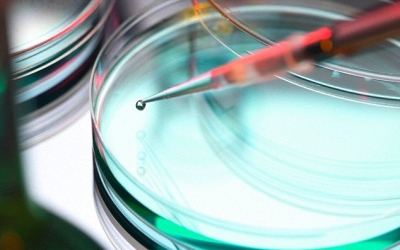- Latest news▼
-
15:32, April 26 ESCMID: New method of purifying the air with ultraviolet light could protect world from new pandemic

-
08:43, April 26 Enzymes that convert different blood groups into first group are discovered

-
19:41, April 25 Children’s Hospital Los Angeles and International Center of Professional Development Allergy/Immunology Conference

-
17:31, April 25 JAMA: patient grew long, curly eyelashes because of chemotherapy

-
11:08, April 25 Mpox epidemic declared in Republic of the Congo

-
08:31, April 25 OU: quitting smoking 4 times more likely to cure laryngeal cancer

-
01:20, April 25 Paralyzed man in China writes hieroglyphs using neural implants placed in his brain

-
15:11, April 24 Zombie deer disease possibly linked to hunters’ deaths

-
12:27, April 23 Appetite: Scientists found out the secret to the appeal of large portions of fast food

-
10:33, April 23 Scientists test new approach to fighting viruses

-
08:38, April 23 Ketamine may help with postpartum depression

-
22:12, April 22 Unhealthy amount of sugar found in baby food products of a well-known brand

-
19:41, April 22 Air pollution puts health of more than 1.6 billion workers globally at risk

-
17:25, April 22 Scientists found baked goods and lack of sleep to be more dangerous than alcohol

-
16:02, April 22 342 cases of measles recorded in Armenia so far in 2024

All materials
Scientists grow human intestine in the lab

Scientists have managed to grow a piece of human intestine in the laboratory, paving the way for new treatments for gut disorders such as Crohn's disease and even cancer.
The breakthrough was made using adult stem cells, which the researchers used to grow tissue fragments called organoids.
These are three-dimensional organ 'buds' with the potential to develop into tissues with certain functions.
They were then transplanted into mice, where they matured and each animal produced ‘significant’ amounts of fully functional human intestine.
The lead scientist, Dr Michael Helmrath, from the Intestinal Rehabilitation Programme at Cincinnati Children's Hospital in Ohio, said the breakthrough could have many implications.
‘This provides a new way to study the many diseases and conditions that can cause intestinal failure, from genetic disorders appearing at birth to conditions that strike later in life, such as cancer and Crohn's disease.
‘These studies also advance the longer-term goal of growing tissues that can replace damaged human intestine.’
It is hoped that one day, doctors will be able to grow organs as 'spare parts' using a patient's own cells, to repair tissue that is diseased.
Follow NEWS.am Medicine on Facebook and Twitter
- Video
- Event calendar
- Children’s Hospital Los Angeles and International Center of Professional Development Allergy/Immunology Conference
- First Armenian-German Conference entitled “Heart Failure Spring School”
- Allogeneic bone marrow transplant in case of hematological malignancy performed in Armenia for first time
All materials
- Archive
- Most read
month
week
day
- Scientists found baked goods and lack of sleep to be more dangerous than alcohol 1072
- Unhealthy amount of sugar found in baby food products of a well-known brand 1014
- Air pollution puts health of more than 1.6 billion workers globally at risk 1007
- Ketamine may help with postpartum depression 991
- 342 cases of measles recorded in Armenia so far in 2024 990
- Appetite: Scientists found out the secret to the appeal of large portions of fast food 989
- Scientists test new approach to fighting viruses 969
- Zombie deer disease possibly linked to hunters’ deaths 949
- Cognitively stimulating jobs in midlife could lower dementia risk in old age, study finds 851
- BrainStimulation: electrical brain stimulation alleviates anxiety and depression in the elderly 780
- Mpox epidemic declared in Republic of the Congo 733
- Paralyzed man in China writes hieroglyphs using neural implants placed in his brain 728
- JAMA: patient grew long, curly eyelashes because of chemotherapy 654
- Children’s Hospital Los Angeles and International Center of Professional Development Allergy/Immunology Conference 640
- OU: quitting smoking 4 times more likely to cure laryngeal cancer 630
- Find us on Facebook
- Poll





